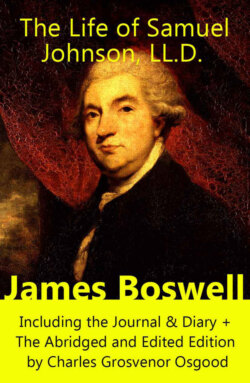Читать книгу The Life of Samuel Johnson, LL.D. - James Boswell - Страница 130
На сайте Литреса книга снята с продажи.
‘TO BENNET LANGTON, ESQ., AT LANGTON, NEAR SPILSBY, LINCOLNSHIRE. ‘DEAR SIR,
Оглавление‘I should be sorry to think that what engrosses the attention of my friend, should have no part of mine. Your mind is now full of the fate of Dury[1014]; but his fate is past, and nothing remains but to try what reflection will suggest to mitigate the terrours of a violent death, which is more formidable at the first glance, than on a nearer and more steady view. A violent death is never very painful; the only danger is lest it should be unprovided. But if a man can be supposed to make no provision for death in war, what can be the state that would have awakened him to the care of futurity? When would that man have prepared himself to die, who went to seek death without preparation? What then can be the reason why we lament more him that dies of a wound, than him that dies of a fever? A man that languishes with disease, ends his life with more pain, but with less virtue; he leaves no example to his friends, nor bequeaths any honour to his descendants. The only reason why we lament a soldier’s death, is, that we think he might have lived longer; yet this cause of grief is common to many other kinds of death which are not so passionately bewailed. The truth is, that every death is violent which is the effect of accident; every death, which is not gradually brought on by the miseries of age, or when life is extinguished for any other reason than that it is burnt out. He that dies before sixty, of a cold or consumption, dies, in reality, by a violent death; yet his death is borne with patience only because the cause of his untimely end is silent and invisible. Let us endeavour to see things as they are, and then enquire whether we ought to complain. Whether to see life as it is, will give us much consolation, I know not; but the consolation which is drawn from truth, if any there be, is solid and durable; that which may be derived from errour must be, like its original, fallacious and fugitive. I am, dear, dear Sir, your most humble servant,
